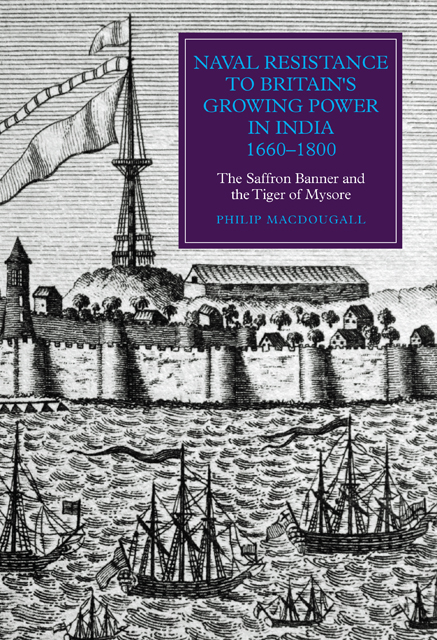 Naval Resistance to Britain's Growing Power in India, 1660–1800
Naval Resistance to Britain's Growing Power in India, 1660–1800 Book contents
- Frontmatter
- Contents
- List of Illustrations
- Abbreviations
- Chronology
- Maps
- Preface
- Part I Early Naval Resistance: The Historical Background
- Part II The Saffron Banner: Irregular Naval Warfare against an Emergent Britain
- Part III The Tiger of Mysore: A Conventional Navy to Oppose British Dominance
- Conclusion
- Bibliography
- Index
- Worlds of The East India Company
7 - Jamalabad: Main Fleet Base of the Mysore Navy
Published online by Cambridge University Press: 23 February 2023
- Frontmatter
- Contents
- List of Illustrations
- Abbreviations
- Chronology
- Maps
- Preface
- Part I Early Naval Resistance: The Historical Background
- Part II The Saffron Banner: Irregular Naval Warfare against an Emergent Britain
- Part III The Tiger of Mysore: A Conventional Navy to Oppose British Dominance
- Conclusion
- Bibliography
- Index
- Worlds of The East India Company
Summary
Off Mangalore [Jamalabad]. Half past five. Mount Dilla bearing North-East by East. Saw Haidar Aly’s fleet close in-shore consisting of two ships, one snow, three ketches and nine gallivats.
Captain’s log, HMS Coventry, 29 November 1780
Haidar Ali, as founder of Mysore’s father and son dynasty, was a great moderniser. In analysing his European adversaries, he realised not only the importance of their efficient and well-equipped armies but that of their navies which ultimately sealed their presence in India. While merchant ships helped create the wealth by shipping sizeable amounts of commodities back to Europe, it was the navy that provided ultimate protection. In turn, of course, with the wealth secured, the construction of a larger and more powerful navy was possible. If, therefore, Haidar Ali was to better his enemy, he must take similar steps to develop his own trading fleet and the ships needed to protect it. Eventually, a further stage would be reached, that of having a sufficiency of naval power to take on and defeat the colonisers at sea. That this was his intention is evidenced by instructions left to his son, Tipu Sultan, in which he stated that for the purpose of expelling the British, ‘from the lands they have invaded’, it would be necessary to use against them their own weapons both on land and sea. In these endeavours, the port and dockyard city of Jamalabad, formerly Mangalore and always known as such by the British, was to play an especially crucial role. A more recent renaming of the city has resulted in it being now known as Mangaluru.
A further factor in Haidar Ali’s thinking was that of acquiring European knowledge for the purpose of turning it against them. As a cavalry commander, he had fought in the Second Carnatic War (1749–54), a succession conflict that involved several southern India states together with the French and British. The two European states not, at this time, wishing to be openly at war with one another, gave their support to opposing sides through the provision of military advisers and mercenaries. Haidar Ali, fighting alongside the British and latterly the French, learnt much of European methods of warfare and their weapons. With the return of peace, and through ‘paying and rewarding well’, he recruited a number of Europeans into his own military force.
- Type
- Chapter
- Information
- Naval Resistance to Britain's Growing Power in India, 1660–1800The Saffron Banner and the Tiger of Mysore, pp. 139 - 166Publisher: Boydell & BrewerPrint publication year: 2014
